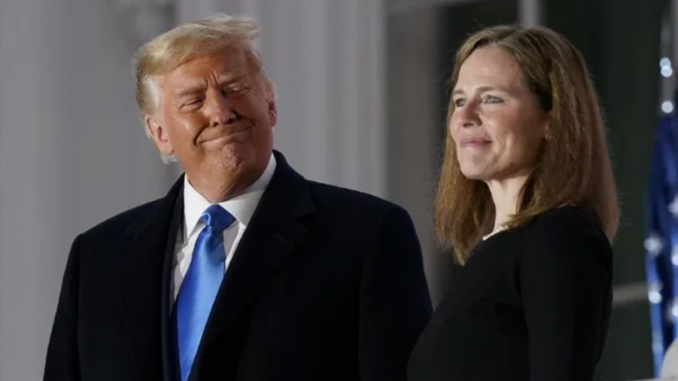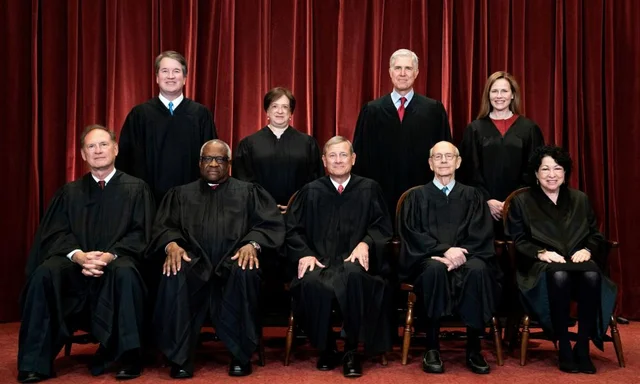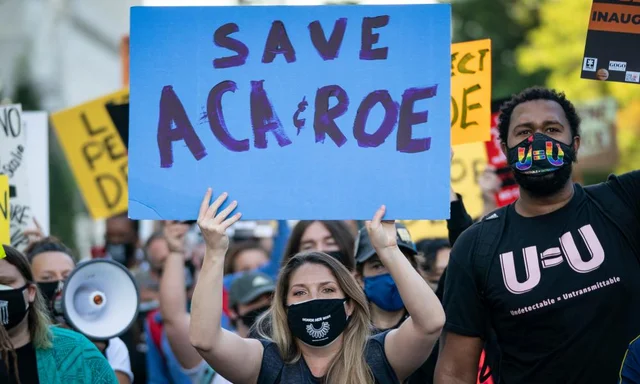
Donald Trump’s presidency was capricious and chaotic, but there was one issue on which he focused with laser-like discipline: tilting the judiciary to the right.
Now America is about to reap that harvest. In the next year the supreme court is set to consider healthcare, voting, LGBTQ rights, guns and, most explosively, abortion. The cases provide a vivid demonstration of how, after being rejected at the ballot box, conservative partisans could push their agenda through the courts instead.
“Next year’s supreme court term is shaping up to be the revenge of Donald Trump,” said Edward Fallone, an associate professor at Marquette University Law School.
It was always said that, long after the tweets and leaks were forgotten, Trump’s judicial legacy would endure. He appointed 234 judges, including 54 appellate judges, outpacing Barack Obama’s first term total of 172 and George W Bush’s 204.
The blitz included three supreme court justices, most recently Amy Coney Barrett, a devout Catholic, who replaced Ruth Bader Ginsburg following the liberal linchpin’s death, handing conservatives a 6-3 majority.
Just after Barrett’s arrival and Joe Biden’s victory, the court heard arguments in a new challenge to Barack Obama’s signature healthcare law, the Affordable Care Act. A decision is expected soon. If the court’s conservatives overturn Obamacare, they would succeed where Republicans in Congress failed.
That outcome is seen as unlikely, but the right is expected to fare better in two cases brought by Democrats contending that voting restrictions in Arizona are racially discriminatory. A ruling, expected soon, could make it harder to challenge dozens of other Republican-led voting measures in the wake of last year’s election.
Another looming case involves a Roman Catholic adoption agency in Philadelphia that argues it is entitled to discriminate against potential foster parents on the basis of sexual orientation. Arguments at a hearing last November again implied that the conservative majority will rule in favour of the agency.
The supreme court’s 2020-21 term offers further flashpoints. The nine justices will review a challenge to New York’s restrictions on people carrying concealed handguns in public. It will be the court’s first major gun rights case in more than a decade, even as Biden pushes for Congress to tackle America’s firearm violence epidemic.
And, it emerged this week, America’s highest court will also consider a bid to revive a Republican-backed state law that would ban abortion after 15 weeks of pregnancy. The eventual ruling could undercut the seminal 1973 Roe v Wade decision that enshrined a woman’s right to abortion nationwide.

Fallone believes the move is a sign that the court’s conservatives are no longer worried about Chief Justice John Roberts casting a decisive vote against them. “The only reason to take this case would be to overturn Roe,” he said. “They’re pretty confident they can succeed without it.”
Despite holding the White House and both chambers of Congress, Democrats have few options in the short term. Fallone, who unsuccessfully ran for the Wisconsin supreme court as a Democrat, added: “I don’t really think realistically that there is much that the Democrats can do about the court. The conservative majority is going to be emboldened next term.
“They’ve been waiting for that moment for a long time and it’s finally going to arise. The second amendment case involving the New York law against carrying firearms openly in public is also setting up next term to be a big win for conservatives potentially as well.”
A commission established by Biden to study potential changes to the supreme court held its first meeting on Wednesday. It has six months to issue a report on reforms including possibly expanding the number of justices to 13, an idea championed by some liberal activists and Democratic members of Congress.
Christopher Kang, co-founder and chief counsel of the pressure group Demand Justice, said: “From the gun violence prevention case to the abortion case, the Republican super majority on the supreme court is showing that it is full steam ahead with its ultra-conservative agenda regardless of what the country thinks.
“Ultimately we have to grapple with the need for structural reform of the supreme court. We’re just starting to build the education and activism around this and gaining momentum in Congress. As the supreme court continues to take these grossly political steps, unfortunately they’re going to make the argument for us about why the supreme court needs to be reformed.”
A bill to expand the court was introduced in Congress last month but Democratic moderates have expressed scepticism. Kang insisted: “Sooner or later, this is going to be a question that comes to the Democrats about how we’re going to preserve our democracy. The need to add supreme court seats, regrettably, is going to become very clear within the next couple of years.”
Republicans have opposed the idea of expanding the number of justices, sometimes described as “court packing” and last seriously attempted by the Democratic president Franklin Roosevelt in the 1930s. They deny that they are using the courts as a workaround to subvert democracy and impose a form of minority rule.
Curt Levey, president of the rightwing advocacy group the Committee for Justice, said: “I don’t see Biden’s narrow victory as an endorsement of abortion on demand, which is pretty much the current regime or, for that matter, as an endorsement of draconian restrictions on handguns. So I guess I don’t really see it as being out of step.

“I think the opposite was true for many decades where the supreme court represented elite opinion that was out of touch with the majority. Perhaps for the first time, the supreme court is more in line with the American people generally. I certainly understand why the left is upset that they’ve lost an institution that helped them to implement their agenda.”
In fact Biden won the national popular vote by 7m ballots. About six in 10 Americans believe abortion should be legal in all or most cases, according to the Pew Research Center, although the partisan split over the issue has deepened in recent years.
Meagan Hatcher-Mays, director of democracy policy at the grassroots movement Indivisible, said: “Most people in the United States think that abortion should be legal and easy to access so it’s not really a political winner for Republicans, especially among suburban women, to go at women’s bodily autonomy like this legislatively.
“If the courts do it, then they get what they want and they don’t face any blowback for it because it wasn’t them that did it. They didn’t pass a law that says abortion is bad; they got the supreme court to do it. And so that’s what this 40-year project has been about: stacking the courts with people that are conservative loyalists and who will do the unpopular dirty work of Republicans that they can’t get done legislatively.”
It is a very long game. A recent article in the Atlantic magazine noted that Trump’s judges will not reach the peak of their influence until the early 2040s, when they are likely to lead nearly every appeals court at the same time.
Hatcher-Mays warned: “The lower courts also have been hijacked, frankly, by people who are loyal not just to conservative values but Republican political outcomes. That was Trump’s big legacy. Not every case goes to the supreme court; a lot of them are decided at the lower level; a lot of those people that he picked are Trumpian-type judges. So that’s really, really scary.”
*story by The Guardian


